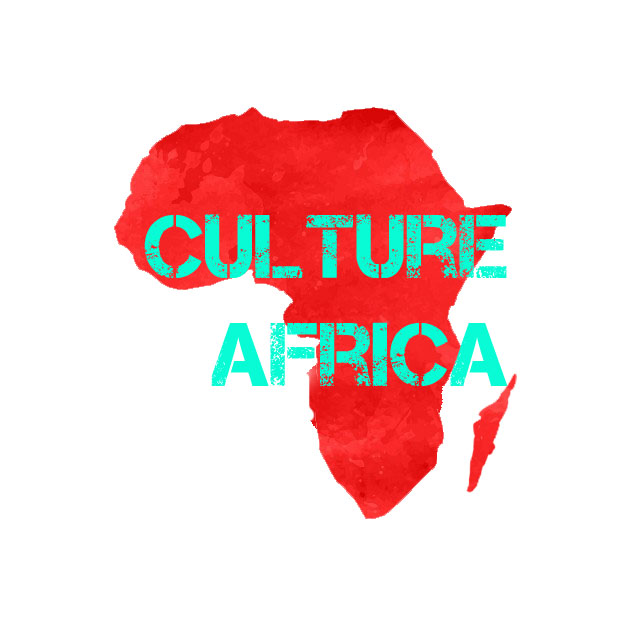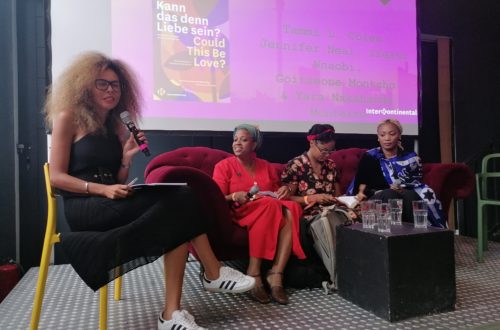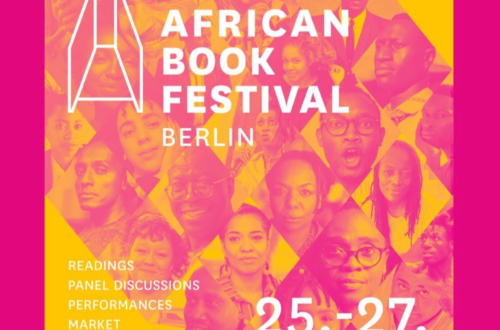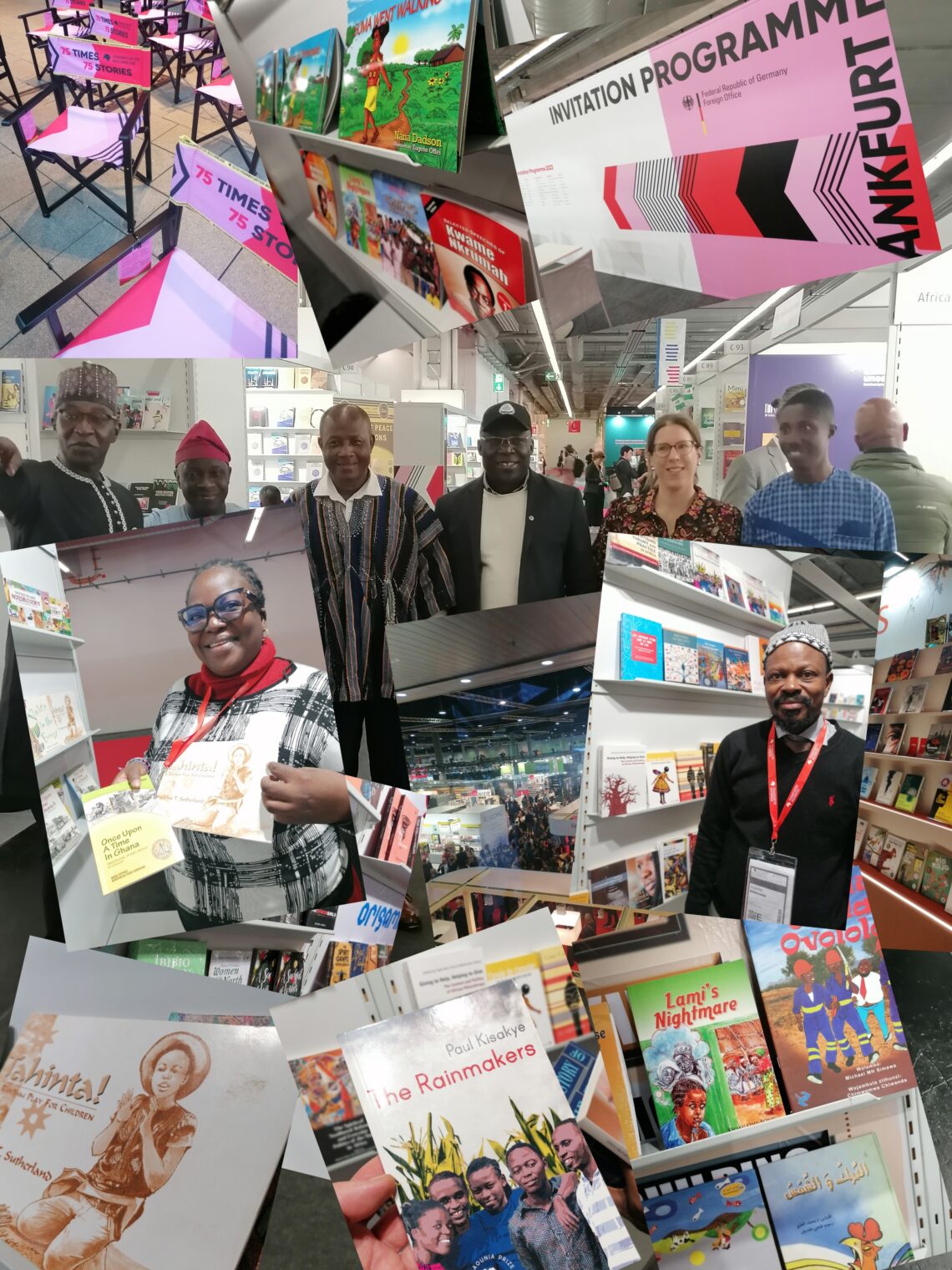
African Publishers on the Book Fair in Frankfurt: And The Story Goes On english/deutsch
It was another real book fair in Frankfurt. One with lots of visitors, almost like before the pandemic. The last three years were empty, the book fair only took place online once, the two years after that it was a very limited event. But even during this time, when visitors were rather rare, smaller publishers from the continent also showed up at the fair at the invitation of the Frankfurt Book Fair, the Invitation Program https://www.buchmesse.de/en/fellowship-and-grant-programmes/frankfurt-invitation-programmes, cultureafrica.net reported on this. So this year it was once again a crowd-puller. And in Hall 6, where the publishers and networks from Africa were to be found, there was also a lot going on again. This is the 75th edition of this huge trade fair, whose motto this year was “And the story goes on”. Nevertheless, it has to be said that the many publishers, from Morocco to South Africa, are few and far between, and larger publishers from Nigeria, South Africa and Kenya are not represented. cultureafrica goes in search of clues.

African Publishers on the Book Fair in Frankfurt: And The Story Goes On by Hans Hofele
FÜR DIE DEUTSCHE VERSION NACH UNTEN SCROLLEN
The very first stop is astonishing: there stands 14-year-old Ebubechukwu Okpaladim, a young author from Nigeria. She started writing at the age of twelve. What is astonishing is that she mainly focuses on adult topics. She has already published four books. She proudly talks about her books, which have titles such as “Hidden Conspiracy”, a thriller in which she deals with themes of fear and evil.

However, she is primarily concerned with overcoming these themes; she wants to write books as inspiration for her generation. “The Broken Home”, “Refugee” and “Sandra, The Sickler” are the others. She is already well-known in Nigeria. And, as she tells me, not so much through social media. It’s the books that inspire young people. In “The Refugee”, she talks about topics such as migration and human trafficking. All the books are produced by the investment company Pibok Invest from Nigeria. We will see what Ebubechukwu surprises us with in the future.
Sulaiman Adebowale from Dakar, Senegal, is an “old hand” in the business and has been at the book fair several times. He represents Amalion Verlag.https://www.amalion.net/ He has been in the publishing business for three decades. The Amalion publishing house he founded aims to publish and disseminate innovative knowledge about Africa in order to strengthen the understanding of humanity.” Why is it important to be represented here at the trade fair in Frankfurt?
“If you opt for the traditional models of sales, marketing and printing, then a trade fair as big as the one in Frankfurt makes sense. The trade fair itself is also changing and adapting to the times. In the past, we couldn’t even sell a book here. Fortunately, that has changed.” Global networking is also very important to him. The books are mainly published in French, but also in English, so the international markets are there.
Spreading multidisciplinary knowledge, knowledge about culture, the environment, history, science, that is his concern, the mission of Amalion. This is reflected in the publications. From “Religious Encounters and Social Dynamics in Burkina Faso” to “Innovation Ecosystems in Africa”, musical journeys with Youssu N’Dour and a collection of poems by Tade Aina. Non-fiction and fiction with high quality standards, that is his claim.https://www.amalion.net/catalogue/
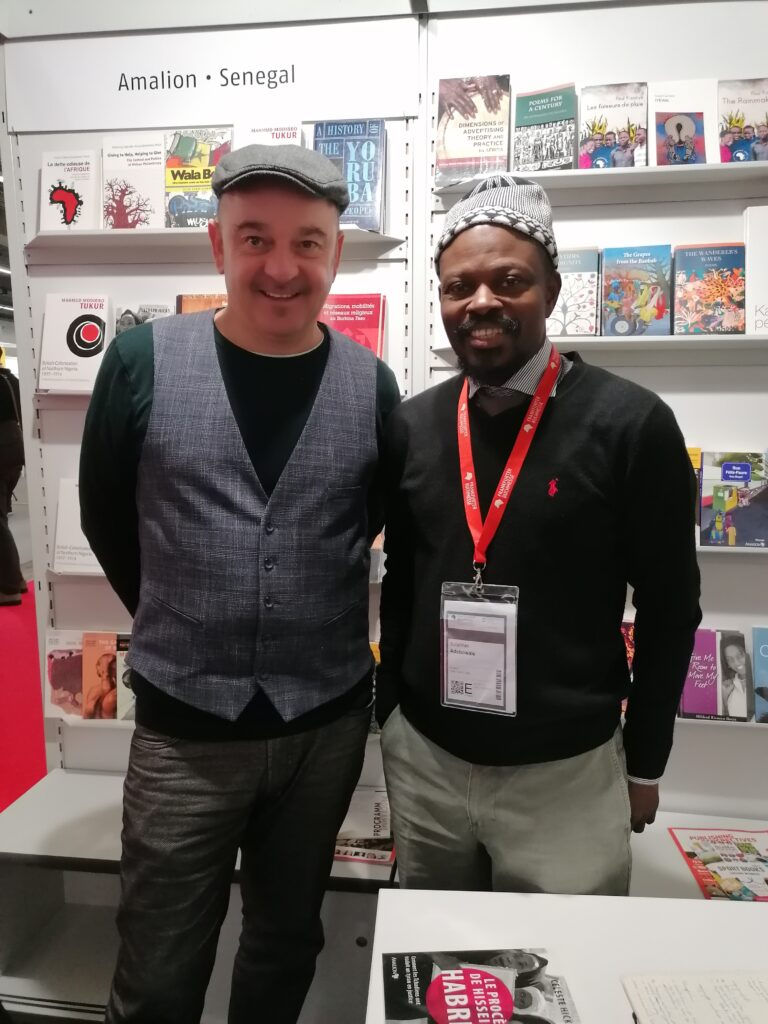
“I appreciate the opportunity to be here and to have the chance to network with so many people. That is immensely important. Also the personal contact. The many participants in the Invitation Program alone networked in their own personal way. that’s very important. I also have a duty to represent the many authors in my publishing house. Perhaps there will be interested parties who want to buy the rights. It’s not just about selling books.”
“This is also the right platform for authors to apply for rights. Translations play a major role. If a certain topic is important for a country, it must also appear in a language that is spoken in that country, otherwise it makes no sense.”
The print quality of the books also plays a major role, the cover design. Not a minor matter for Sulaiman Adebowale. The quality of the many small African publishers does not always keep pace with international standards in book design. Not so with Amalion. “We look around the world to see where we can have our books produced. But that also requires you to know your distribution channels. Printing in China or the UK, then selling in France and Senegal, for example. It’s a challenge.”
One stand further on is Azafi Omoluabi from Parrésia Publishers in Lagos, Nigeria. A publishing house that has existed since 2012 and also has a bookshop and online store in the city.https://pagebookstore.com/ Parrésia is also the publishing house that publishes the authors Helon Habila, T.J. Benson and Lola Akinmadé Akerström (In every Mirror she is Black), who are well-known in Germany. He specializes in literary fiction. This sector is not always number one in African countries when it comes to book publishing. This is another of Nigeria’s strengths and makes the country a superpower in the literary world. Many Nigerian authors are known worldwide.
“Of course, we also use amazon for our sales. But we also have an international presence at trade fairs and literary events. That’s very important. It’s great to see that trade fairs and literary events on the African continent are growing steadily. Something is happening everywhere. The interest is there. Big publishing houses like Random House are still not in Nigeria. Individual authors are of course signed by Random House for the global market, but there is no publishing activity in the country yet. This gives local publishers the opportunity to publish Nigerian authors. It’s their job.” Nigeria, with more than 200 million inhabitants, is still a “growing market” when it comes to books. “Yes, there is a certain group of buyers when it comes to fiction. But they also buy a lot of books. But in general, people read a lot in Nigeria. And yes, it has not become easier to bring books onto the market and sell them for an affordable price due to increased costs.”
Angela represents the African Books Collective. https://www.africanbookscollective.com/ABC is an Oxford, UK-based organization dedicated to the promotion, marketing and distribution of African authors since 1985. In its own words, it is “a collective self-help initiative to strengthen their economic base and meet the needs of libraries and other book buyers”.
The ABC uses its good contacts in distribution structures worldwide to help African publishers with marketing. Angela has Indian roots. When asked whether there are many African authors in the bookshops in Oxford, she says: “There could be more. Even from India, which is also an English-speaking country, there aren’t that many authors. The same applies to India itself, by the way. There are mostly Indian books in bookshops there, so it’s not just a European problem.”

Harriet Adelaide Tagoe from Accra, Ghana, represents the publishing house Afram, which has been in existence for 50 years. The publishing house specializes in books for children and young people, but also in literature from Ghana. Local languages have been an important topic for Afram Publishing House, http://www.aframpubghana.comwhich also produces a lot for Ghanaian schools, ever since the publishing house was founded:
“We have books in local languages, which are then also translated into English. And the other way around”. UNESCO has made Accra the World Book Capital this year. The promotion of local languages certainly plays a role in this. “UNESCO has confirmed that reading in local languages is especially important for young readers and is part of their identity. We encourage the children to do so. Of course, a public school doesn’t have the same resources as a private school. What we also try to do is bring book authors and translators to the children so that an exchange can take place and the children can ask questions.”
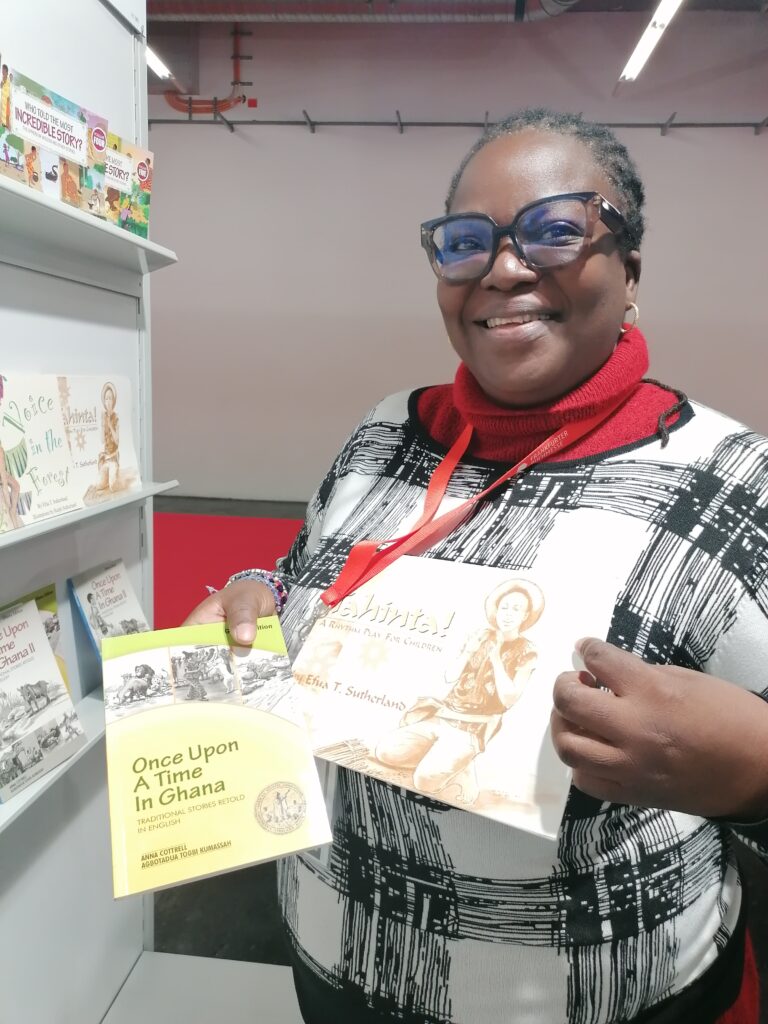
She admires the readings here at the fair and outside, which attract a great deal of public interest. I wanted to know how book production has changed for Afram: “When I look around at the book fair here, of course I see the change, also in terms of book design. it makes a difference when books, including children’s books, are well produced, when the book covers literally jump out at you. I also see well-made African children’s books. We want that too. We want well-made books. It may take a little longer, but we will get there. We have to push harder so that we can get the good content to the readers with an appropriate design. of course, it’s also a question of cost. If you print in India, there are sometimes compromises in quality. But economically, printing in Europe makes little sense. A new tax law also favors printing in Ghana. This means that print jobs from India or China are brought back to our country, which also creates jobs.”
Afram has built up a very good reputation in Ghana over the last 50 years. They can hope for coveted orders from the government for public schools. That accounts for a large proportion of the orders.
Even if there is the wish that more african publishers will show up in the future, the ones that had been there this year is a good sign. And a great work of the Invitation Program.
copyright: cultureafrica.net 2023
DEUTSCHE VERSION
Es war wieder eine richtige Buchmesse in Frankfurt. Eine mit vielen Besuchern, fast wie vor der Pandemie. Die letzten drei Jahre herrschte Leere, die Buchmesse fand einmal nur online statt, die zwei Jahre danach war es ein sehr eingeschränktes Event. Doch auch in dieser Zeit, als Besucher eher rar waren, zeigten sich, auf Einladung der Frankfurter Buchmesse, das Invitation Programme https://www.buchmesse.de/en/fellowship-and-grant-programmes/frankfurt-invitation-programmes, auch kleinere Verlage vom Kontinent auf der Messe, cultureafrica.net berichtete davon. Dieses Jahr also war es wieder ein Publikumsmagnet. Und auch in Halle 6, wo die Verlage und Netzwerke aus Afrika zu finden waren, war wieder was los. Es ist die 75. Ausgabe dieser riesigen Messe, deren Motto dieses Jahr “And the Story goes on” war.
Dennoch muss festgestellt werden: die vielen Verlage, von Marokko bis Südafrika sind rar, größere Verlage aus Nigeria, Südafrika und Kenia sind nicht vertreten. cultureafrica macht sich auf Spurensuche.

Gleich die erste Station lässt staunen: Dort steht die 14-Jährige Ebubechukwu Okpaladim, junge Autorin aus Nigeria. Mit zwölf Jahren hat sie mit dem Schreiben begonnen. Erstaunlich ist, dass sie sich vor allem Erwachsenen-Themen widmet. Sie hat bereits vier Bücher veröffentlicht. Stolz erzählt sie von ihren Büchern, die Titel wie “Hidden Conspiracy”, ein Thriller, in dem sie Motive der Angst und dem Bösen verarbeitet.

Ihr geht es aber in erster Linie um die Überwindung dieser Themen, sie möchte Bücher als Inspiration für ihre Generation schreiben. “The Broken Home”, “Refugee” und “Sandra, The Sickler” sind die anderen. In Nigeria ist sie bereits bekannt. Und das, wie sie mir erzählt, weniger über Social Media. Es sind die Bücher, die die jungen Menschen begeistern. In “The Refugee” erzählt sie von Themen wie Migration und Human Trafficing. Alle Bücher sind von der Investment Firma Pibok Invest aus Nigeria produziert. Wir werden sehen, womit uns Ebubechukwu in Zukunft überrascht.
Ein “alter Hase” im Geschäft und schon öfters auf der Buchmesse war Sulaiman Adebowale aus Dakar, Senegal. Er vertritt den Amalion Verlag.https://www.amalion.net/ Er ist seit drei Jahrzehnten im Verlagsbusiness. Sein von ihm gegründeter Amalion Verlag hat sich zum Ziel gesetzt, innovatives Wissen über Afrika zu veröffentlichen und zu verbreiten, um das Verständnis der Menschheit zu stärken.” Warum ist es wichtig, hier auf der Messe in Frankfurt vertreten zu sein,möchte ich von ihm wissen?
“Wenn du dich für die traditionellen Modelle des Vertriebs, Marketings, Drucks entscheidest, dann macht eine solch große Messe wie die in Frankfurt Sinn. Auch die Messe selbst verändert sich, passt sich der Zeit an. Früher konnten wir noch nicht mal ein Buch hier verkaufen. das hat sich zum Glück verändert.” Auch die weltweite Vernetzung ist für ihn sehr wichtig. Die Bücher erscheinen überwiegend in Französisch, aber auch in Englisch, da sind die internationalen Märkte vorhanden.
Multi-Disziplinäres Wissen zu verbreiten, Wissen um die Kultur, Umwelt, Geschichte, Wissenschaft, das ist sein Anliegen, die Mission von Amalion. Dies spiegelt sich in den Publikationen wieder. Von “Religious Encounters and Social Dynamics in Burkina Faso” über “Innovation Ecosystems in Africa”, musikalische Reisen mit Youssu N’Dour bis zur Gedichtsammlung von Tade Aina. Sachbuch und Belletristik mit hohem qualitativem Anspruch, das ist sein Anspruch.https://www.amalion.net/catalogue/
“Ich schätze die Möglichkeit, hier zu sein und die Möglichkeit zu haben, mich mit so vielen Menschen, zu vernetzen. Das ist immens wichtig. Auch der persönliche Kontakt. Allein schon die vielen Teilnehmer:innen des Invitation Programs vernetzten sich auf ihre ganz persönliche Art. das ist sehr wichtig. Ich habe ja auch die Pflicht, die vielen Autor:innen meines Verlags zu vertreten. Vielleicht ergeben sich Interessenten, die die Rechte kaufen wollen. Es geht nicht nur darum Bücher zu verkaufen. Gerade auch für das werben um Rechte für Autor:innen ist hier die richtige Plattform. Übersetzungen spielen eine große Rolle. Wenn ein bestimmtes Thema für ein Land wichtig ist, muss es auch in einer Sprache erscheinen, das in dem betreffenden Land gesprochen wird, sonst macht es keinen Sinn.”

Auch die Druckqualität der Bücher spielt eine große Rolle, das Coverdesign. Für Sulaiman Adebowale keine Nebensache. Nicht immer hält die Qualität der vielen afrikanischen Kleinverlage Schritt mit den internationalen Standards im Buchdesign. Anders bei Amalion. “Wir schauen weltweit, wo wir produzieren lassen können. Das setzt aber auch voraus, dass du deine Vertriebswege kennst. Drucken in China oder Großbritannien, dann verkaufen in Frankreich und Senegal als Beispiel. Es ist eine Herausforderung.”
Ein Stand weiter steht Azafi Omoluabi von Parrésia Publishers aus Lagos, Nigeria. Ein Verlag, der seit 2012 existiert und auch einen Buchladen und Onlineshop in der Stadt unterhält.https://pagebookstore.com/ Parrésia ist auch der Verlag, der auch die in Deutschland bekannten Autoren Helon Habila, T.J.Benson und Lola Akinmadé Akerström (In every Mirror she is Black) verlegt. Er ist auf literarische Fiktion spezialisiert. Diese Sparte ist in afrikanischen Ländern nicht immer die Nummer Eins wenn es um Buchverlage geht. Auch darin liegt die Stärke Nigerias, macht das Land zur Superpower in der Literaturwelt. Viele nigerianische Autor:innen sind weltweit erfolgreich. Azafi Omoluabi ist Mitgründerin des Verlags. Sie ist das zweite Mal auf der Buchmesse in Frankfurt.
Frankreich war Gastland der Buchmesse, dieses Jahr Slowenien. Seit Jahren jedoch kein afrikanisches Land. Müsste nicht Nigeria zwingend ein Gastland sein, frage ich sie:”Unbedingt!” ,sie lacht. Sie macht das Schulsystem und das Lernen außerhalb der Schule mitverantwortlich für die hohe Zahl an Autor:innen, viele davon sind auch außerhalb Nigerias erfolgreich.
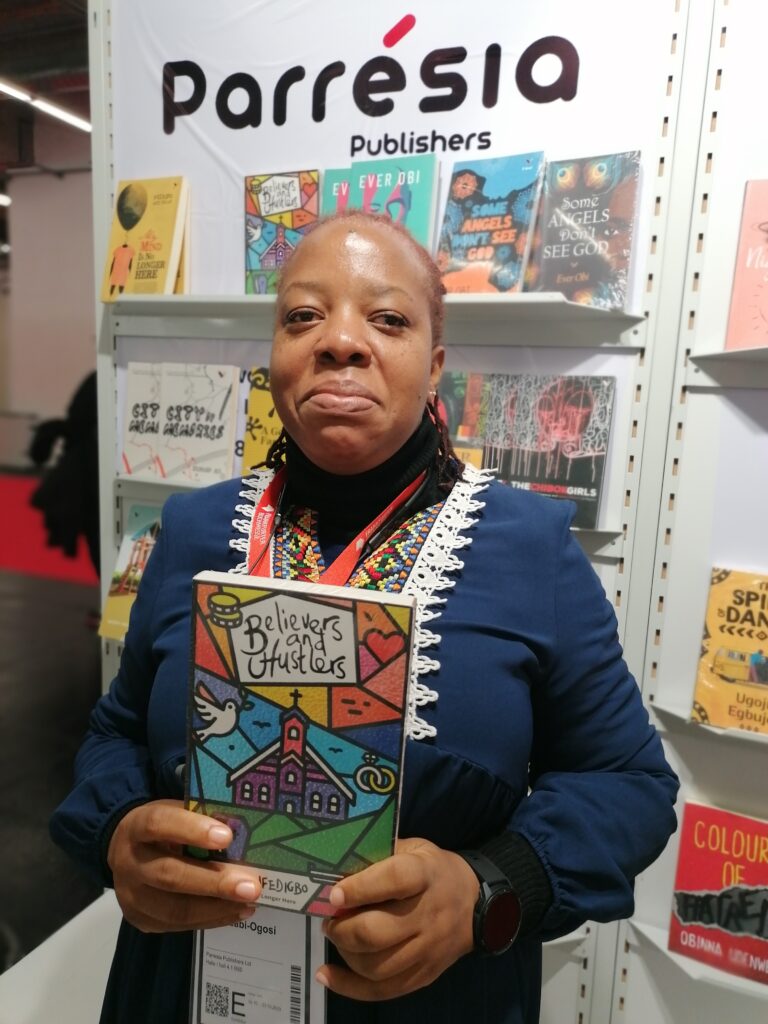
“Natürlich nutzen wir auch amazon für unseren Vertrieb. Aber wir sind auch international auf Messen und Literaturevents präsent. Das ist schon sehr wichtig. Es ist schön zu sehen, dass die Messen und literarischen Events auf dem afrikanischen Kontinent stetig wachsen. Überall passiert etwas. Das Interesse ist da. Große Verlagshäuser wie Random House sind immer noch nicht in Nigeria. Einzelne Autor:innen werden natürlich für den weltweiten Markt von Random House unter Vertrag genommen, aber eine verlegerische Tätigkeit im Land gibt es bisher nicht. Das gibt den einheimischen Verlagen die Möglichkeit, nigerianische Autor:innen zu publizieren. Es ist ihre Aufgabe.” Nigeria, mit mehr als 200 Millionen Einwohnern, ist immer noch ein “growing market” wenn es um Bücher geht. “Ja, es ist eine bestimmte Käuferschicht, wenn es um Fiction geht. Die kaufen dann aber auch viele Bücher. Aber generell wird viel gelesen in Nigeria. Und ja, es ist durch gestiegene Kosten nicht einfacher geworden, Bücher auf den Markt zu bringen und sie für einen erschwinglichen Preis zu verkaufen.”
Angela vertritt die African Books Collective. https://www.africanbookscollective.com/Die in Oxford, GB ansässige Organisation hat sich seit 1985 der Förderung, Vermarktung und Distribution afrikanischer Autor:innen verschrieben. Nach eigener Aussage “a collective self-help initiative to strengthen their economic base and meet the needs of libraries and other book buyers”. Das ABC nutzt seine guten Kontakte in die Vertriebsstrukturen weltweit, um afrikanische Verlage bei der Vermarktung zu helfen. Angela hat indische Wurzeln. Auf die Frage, ob es denn in den Buchhandlungen in Oxford viele afrikanische Autor:innen gibt, sagt sie: “Es könnten mehr sein. Selbst aus Indien, das ja auch ein englischsprachiges Land ist, sind nicht so viele Autor:innen vertreten. Dasselbe gilt übrigens auch für Indien selbst. Dort gibt es überwiegend indische Bücher in den Buchhandlungen. es ist also nicht nur ein europäisches Problem.”

Harriet Adelaide Tagoe aus Accra, Ghana vertritt den seit 50 Jahren bestehenden Verlag Afram. Der Verlag ist spezialisiert auf Kinder-und Jugendbücher aber auch auf Literatur aus Ghana. Für den Afram Verlag, der auch viel für ghanaische Schulen produziert, waren und sind lokale Sprachen seit Gründung des Verlags ein wichtiges Thema:
“Wir haben Bücher in lokalen Sprachen, die dann auch in Englisch übersetzt werden. Und der umgekehrte Weg”. Die UNESCO hat Accra dieses Jahr zur Welthauptstadt des Buches gemacht. Die Förderung der lokalen Sprachen spielen dabei sicherlich auch eine Rolle. “Die UNESCO hat uns bestätigt, dass das Lesen in lokalen Sprachen gerade auch für junge Leser:innen wichtig ist, Teil ihrer Identität ist. Wir ermuntern die Kinder dazu. Natürlich hat eine Öffentliche Schule nicht dieselben Mittel wie eine Privatschule. Was wir auch versuchen ist, Buchautor:innen und Übersetzer:innen zu den Kindern zu bringen, damit ein Austausch stattfinden kann, die Kinder können Fragen stellen.”

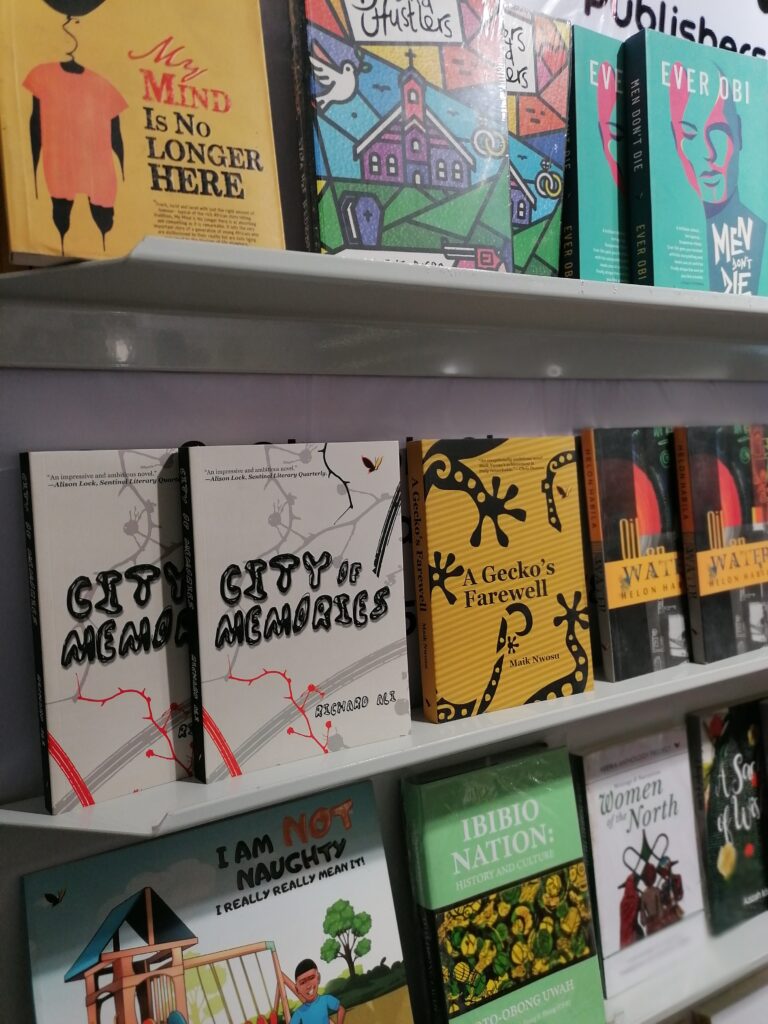
Sie bewundert die Lesungen hier auf der Messe und außerhalb, die auf großes Publikumsinteresse stoßen. Sicherlich eine Besonderheit im deutschsprachigen RaumWie sich das Bücherproduktion für Afram geändert wollte ich noch wissen: “Wenn ich mich auf der Buchmesse hier umschaue, sehe ich natürlich die Veränderung, auch was das Buchdesign angeht. das macht schon einen Unterschied, wenn Bücher, auch Kinderbücher gut produziert werden, wenn einen die Buchcover förmlich anspringen. Ich sehe auch gut gemachte afrikanische Kinderbücher. Das wollen wir auch. Wir wollen gut gemachte Bücher. Es dauert vielleicht etwas länger, aber wir werden dahin kommen. Wir müssen da mehr Druck machen, damit wir die guten Inhalte durch ein entsprechendes Design an die Leser:innen bringen können. es ist natürlich auch eine Kostenfrage. Wenn man in Indien drucken lässt, gibt es manchmal Abstriche in der Qualität. Aber ökonomisch macht ein Druck in Europa wenig Sinn. Durch ein neues Steuergesetzt wird zudem der Druck in Ghana bevorzugt. Es werden also Druckaufträge aus Indien oder China zurückgeführt in unser Land. das schafft ja auch Arbeitsplätze.”
Afram hat sich in den letzten 50 Jahren einen sehr guten Ruf in Ghana erarbeitet. Sie können auf die begehrten Aufträge der Regierung für Public Schools hoffen. Das macht ein Großteil der Aufträge aus.
Hans Hofele
copyright: cultureafrica.net 2023


